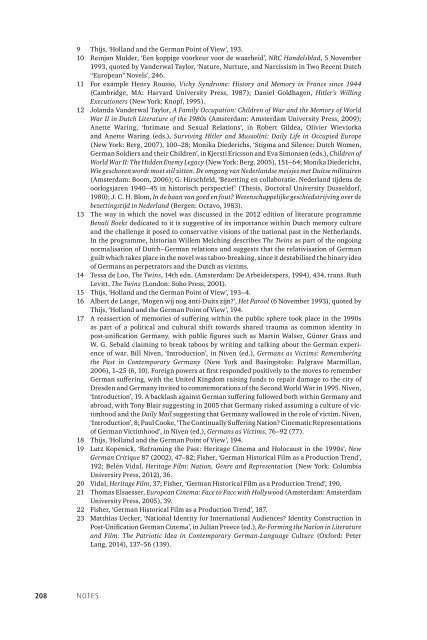Discord Consensus
7aze300jFJo
7aze300jFJo
You also want an ePaper? Increase the reach of your titles
YUMPU automatically turns print PDFs into web optimized ePapers that Google loves.
9 Thijs, ‘Holland and the German Point of View’, 193.<br />
10 Reinjan Mulder, ‘Een koppige voorkeur voor de waarheid’, NRC Handelsblad, 5 November<br />
1993, quoted by Vanderwal Taylor, ‘Nature, Nurture, and Narcissism in Two Recent Dutch<br />
“European” Novels’, 246.<br />
11 For example Henry Rousso, Vichy Syndrome: History and Memory in France since 1944<br />
(Cambridge, MA: Harvard University Press, 1987); Daniel Goldhagen, Hitler’s Willing<br />
Executioners (New York: Knopf, 1995).<br />
12 Jolanda Vanderwal Taylor, A Family Occupation: Children of War and the Memory of World<br />
War II in Dutch Literature of the 1980s (Amsterdam: Amsterdam University Press, 2009);<br />
Anette Waring, ‘Intimate and Sexual Relations’, in Robert Gildea, Olivier Wieviorka<br />
and Anette Waring (eds.), Surviving Hitler and Mussolini: Daily Life in Occupied Europe<br />
(New York: Berg, 2007), 100–28; Monika Diederichs, ‘Stigma and Silence: Dutch Women,<br />
German Soldiers and their Children’, in Kjersti Ericsson and Eva Simonsen (eds.), Children of<br />
World War II: The Hidden Enemy Legacy (New York: Berg, 2005), 151–64; Monika Diederichs,<br />
Wie geschoren wordt moet stil zitten. De omgang van Nederlandse meisjes met Duitse militairen<br />
(Amsterdam: Boom, 2006); G. Hirschfeld, ‘Bezetting en collaboratie. Nederland tijdens de<br />
oorlogsjaren 1940–45 in historisch perspectief’ (Thesis, Doctoral University Dusseldorf,<br />
1980); J. C. H. Blom, In de baan van goed en fout? Wetenschappelijke geschiedstrijving over de<br />
bezettingstijd in Nederland (Bergen: Octavo, 1983).<br />
13 The way in which the novel was discussed in the 2012 edition of literature programme<br />
Benali Boekt dedicated to it is suggestive of its importance within Dutch memory culture<br />
and the challenge it posed to conservative visions of the national past in the Netherlands.<br />
In the programme, historian Willem Melching describes The Twins as part of the ongoing<br />
normalisation of Dutch–German relations and suggests that the relativisation of German<br />
guilt which takes place in the novel was taboo-breaking, since it destabilised the binary idea<br />
of Germans as perpetrators and the Dutch as victims.<br />
14 Tessa de Loo, The Twins, 14th edn. (Amsterdam: De Arbeiderspers, 1994), 434, trans. Ruth<br />
Levitt, The Twins (London: Soho Press, 2001).<br />
15 Thijs, ‘Holland and the German Point of View’, 193–4.<br />
16 Albert de Lange, ‘Mogen wij nog anti-Duits zijn?’, Het Parool (6 November 1993), quoted by<br />
Thijs, ‘Holland and the German Point of View’, 194.<br />
17 A reassertion of memories of suffering within the public sphere took place in the 1990s<br />
as part of a political and cultural shift towards shared trauma as common identity in<br />
post-unification Germany, with public figures such as Martin Walser, Günter Grass and<br />
W. G. Sebald claiming to break taboos by writing and talking about the German experience<br />
of war. Bill Niven, ‘Introduction’, in Niven (ed.), Germans as Victims: Remembering<br />
the Past in Contemporary Germany (New York and Basingstoke: Palgrave Macmillan,<br />
2006), 1–25 (6, 10). Foreign powers at first responded positively to the moves to remember<br />
German suffering, with the United Kingdom raising funds to repair damage to the city of<br />
Dresden and Germany invited to commemorations of the Second World War in 1995. Niven,<br />
‘Introduction’, 19. A backlash against German suffering followed both within Germany and<br />
abroad, with Tony Blair suggesting in 2005 that Germany risked assuming a culture of victimhood<br />
and the Daily Mail suggesting that Germany wallowed in the role of victim. Niven,<br />
‘Introduction’, 8; Paul Cooke, ‘The Continually Suffering Nation? Cinematic Representations<br />
of German Victimhood’, in Niven (ed.), Germans as Victims, 76–92 (77).<br />
18 Thijs, ‘Holland and the German Point of View’, 194.<br />
19 Lutz Kopenick, ‘Reframing the Past: Heritage Cinema and Holocaust in the 1990s’, New<br />
German Critique 87 (2002), 47–82; Fisher, ‘German Historical Film as a Production Trend’,<br />
192; Belén Vidal, Heritage Film: Nation, Genre and Representation (New York: Columbia<br />
University Press, 2012), 36.<br />
20 Vidal, Heritage Film, 37; Fisher, ‘German Historical Film as a Production Trend’, 190.<br />
21 Thomas Elsaesser, European Cinema: Face to Face with Hollywood (Amsterdam: Amsterdam<br />
University Press, 2005), 39.<br />
22 Fisher, ‘German Historical Film as a Production Trend’, 187.<br />
23 Matthias Uecker, ‘National Identity for International Audiences? Identity Construction in<br />
Post-Unification German Cinema’, in Julian Preece (ed.), Re-Forming the Nation in Literature<br />
and Film: The Patriotic Idea in Contemporary German-Language Culture (Oxford: Peter<br />
Lang, 2014), 137–56 (139).<br />
208<br />
NOTES


